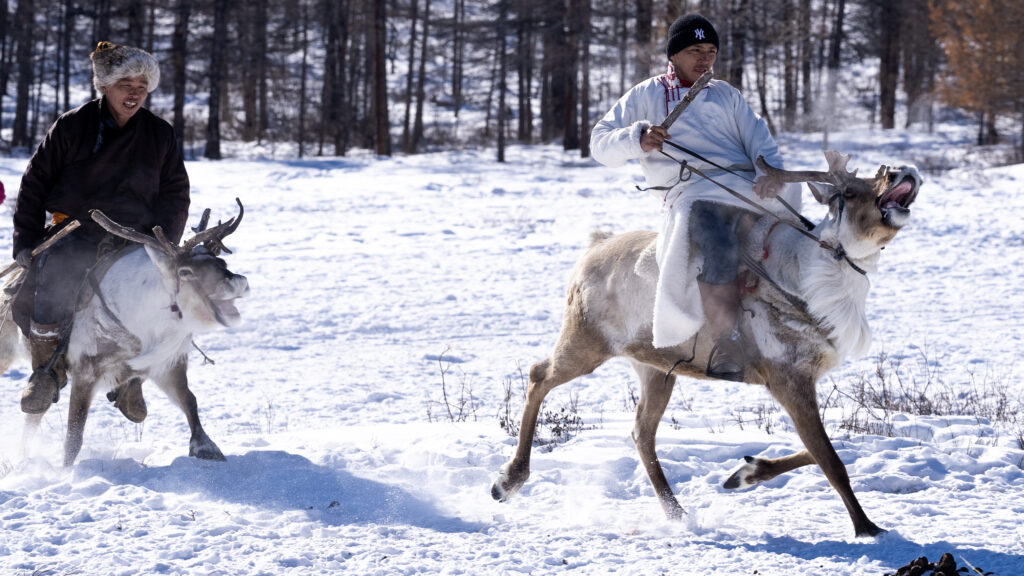03/25/2024 – 21:40
|
Updated: 03/25/2024 – 21:44
When a Tsaatan dies, he is left on the mountainside to become food for the vultures, continuing the cycle of life. According to their tradition, if they return after three days and the scavengers have not eaten the whole body, it means that the soul of the deceased has not recovered properly. In this case, it is necessary to conduct a new ritual to facilitate the transition to a new life. It is a legacy of his shamanic philosophy, a way of understanding life closely linked to nature, especially animals.
In fact, it is said that reindeer are like family to them. Some, with very long and branched horns, others, with trimmed tips, wander about the settlements with all the peace in the world. Truly known as the Reindeer Men of Mongolia, the Tsatans are one of the few cultures that still care for these animals and ride them as if they were horses.
This is a small tribe of about two hundred individuals and is on the verge of extinction. During the year, they change their location several times while searching for the best conditions for their unique flocks. This ancestral bond has led them to adapt to the cold of the Mongolian taiga as if they had blended in with their aquatic companions. In winter, temperatures can drop as low as minus 50 degrees, but this seems to have little effect on them when it comes to living a fairly normal life in one of the most extreme regions in the world.
Tipis hospitality
“Are you cold?” they asked me just to wake me up. The sun had barely risen half an hour ago, but my host had already begun the day. I answered honestly, the frozen feet made it difficult for me to sleep for a few moments of the night, but I managed to sleep enough not to feel exhausted. There was a mixture of concern and laughter in his question.
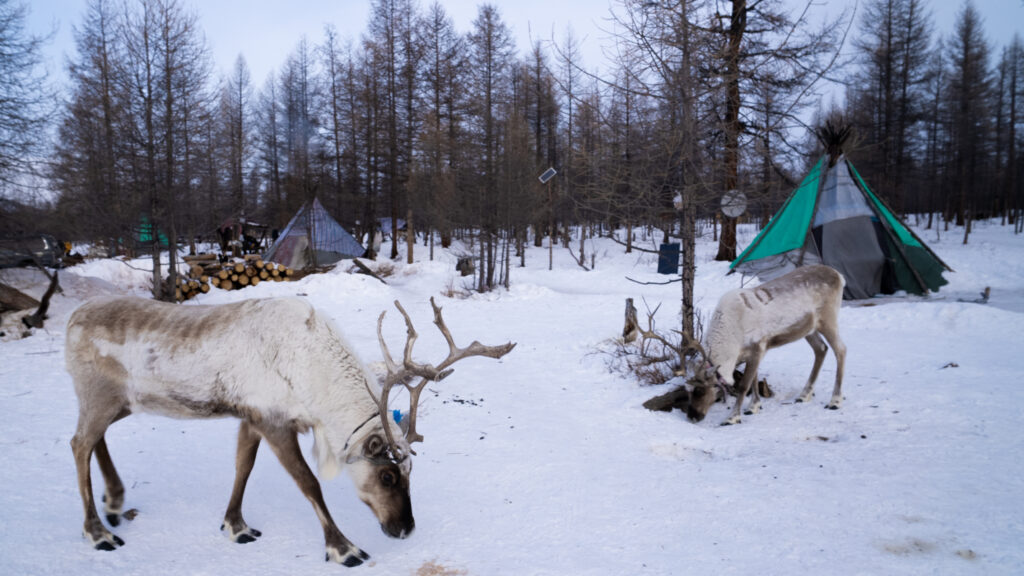
Before going to bed, they had put a few logs in the central hearth, but after a few hours it went out and the cold seeped across the floor and through the fabric of the tepi, the traditional Tsaatan tents, which looked very much like those. From Native Americans. I was surprised to learn that they only did this when they had visitors. In their daily lives, they don't need the stove at night, or even the blanket, very often. They even explained to me that they make these creatures sleep in holes in the snow when there is no room in the tent.
This central fire is the most important part of the mobile home. For them, it is almost sacred. Firewood can only be placed indoors. Plastics and other debris would pollute the purity of the fire, the heart of the home. Moreover, it is a major crime for the feet to touch the stove. You can warm them, but they can't come close to the bill.
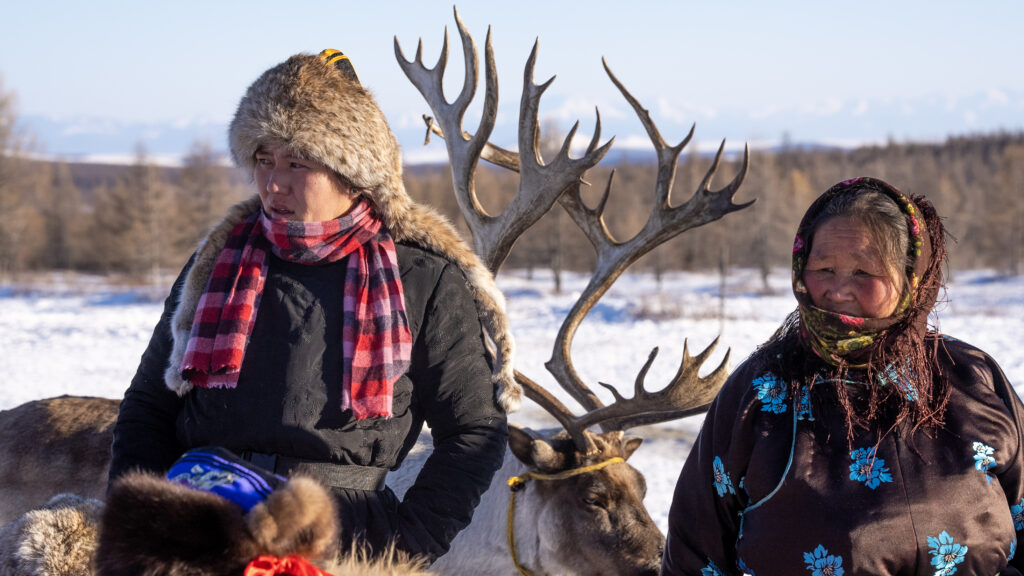
Outside, the reindeer were strutting about in search of moss or grass under the layers of snow and ice that separated them from that precious food. When I came out, some people approached me curiously. They were docile and very tame animals. It was common to find a few of them following me around the settlement, made up of about seven families, each with its own tent and herd of reindeer, though in reality they seemed to be rearing them collectively.
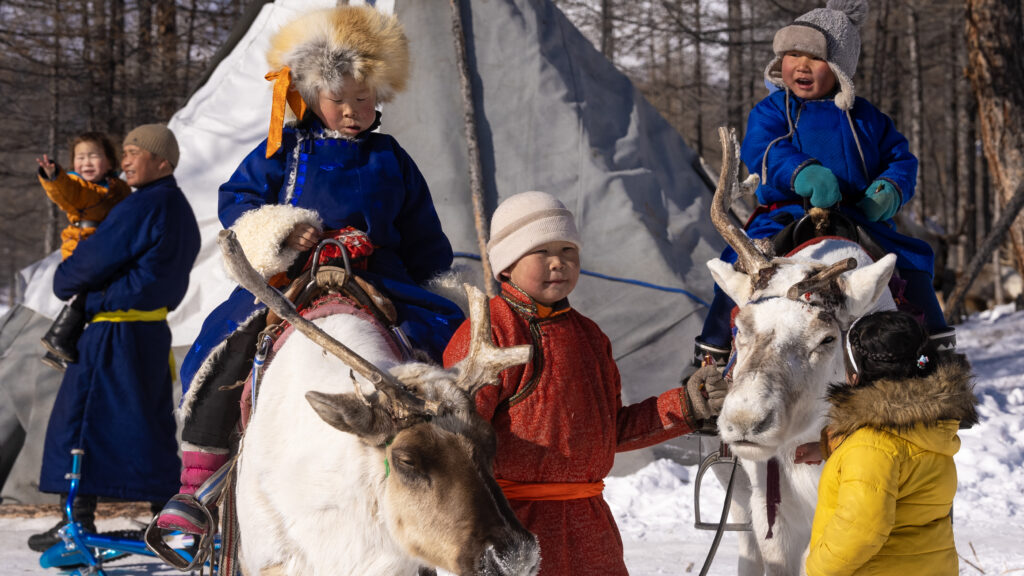
Getting there was a great experience. In fact, for most of the year, the only way to get there is by horse or reindeer or on foot. But in winter, when Lake Khovsgul freezes over and turns into a highway, all-terrain vehicles are able to reach it after long hours of frantic driving over ice and oceans of snow in the mountains.
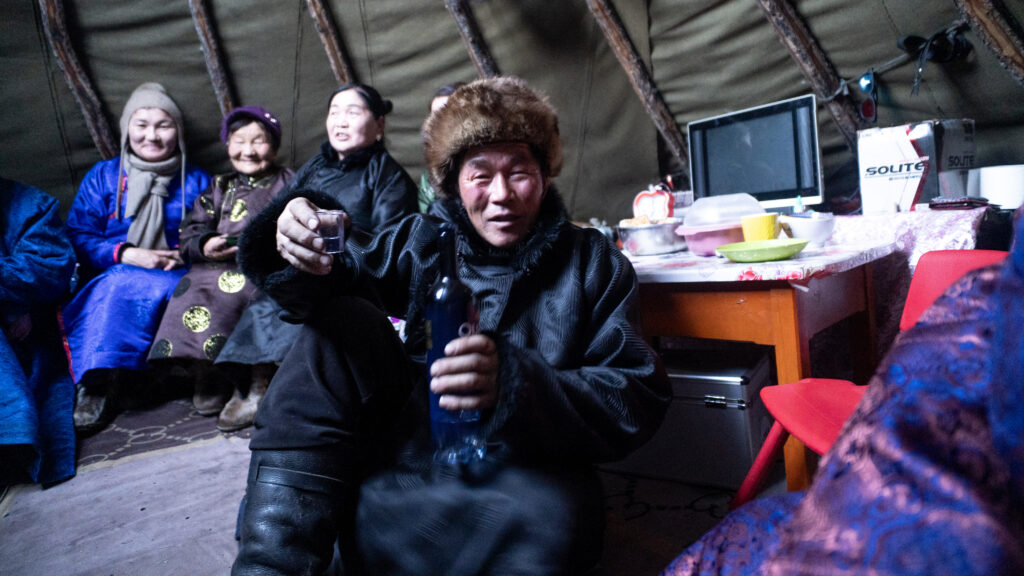
The day passed without much movement. Some men came out of the tent from time to time to cut more firewood. Others went in search of some ignorant reindeer or rode in groups to visit Tsatan settlements. Inside the small houses, women were busy melting snow for water and making tea with cow's milk, the main drink of their daily lives. They also took the opportunity to visit other families in the village or to cook food. It was the star dish vintageClassic packages filled with beef.
When the sun set, my host went outside and shouted. Suddenly dozens of men, women and children followed him out, caught as many reindeer as they could and headed into the taiga. At night, they leave them wandering in the forest in search of food, a sight worth seeing. Hundreds of reindeer entered the trees in single file, a movement very reminiscent of ants. They spent the nights like this, digging and digging with their claws and noses and trying their luck. The next morning, as is the case every day, they return to the settlement to rest near Tsaatan's tent.
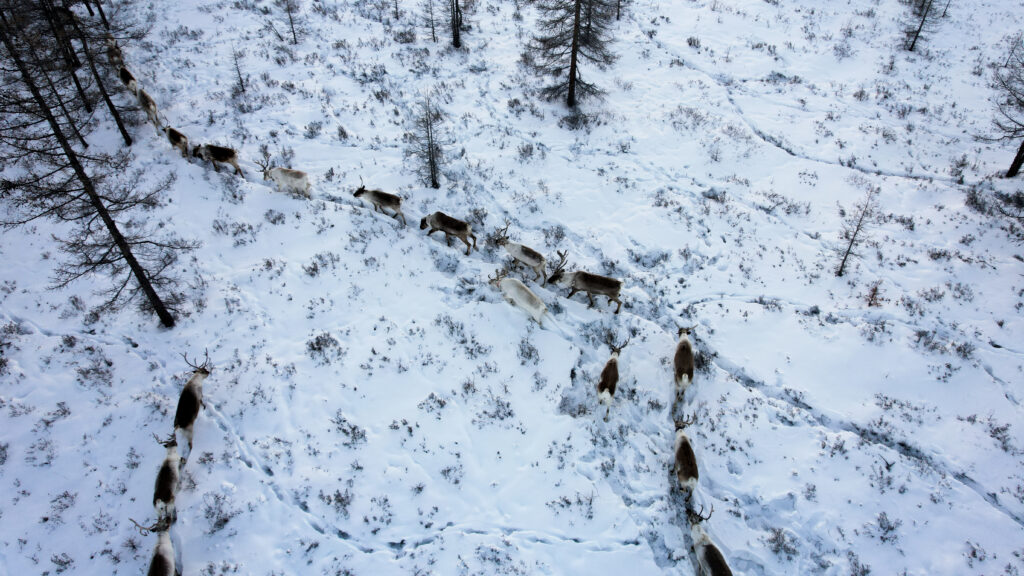
In the vast darkness, without light pollution, the stars stood out powerfully. It was night when several residents approached the home of the local shaman. We crammed into the cabin as much as we could, even though there wasn't room for everyone. The shaman was a woman in her fifties. She tried to wear traditional clothing, which consisted of a multi-layered dress, predominantly blue, and a hat that also served as a mask and covered her vision. In the head area the eyes were drawn. He was about to witness a shamanic ceremony.
The lady took a drum and a goat's leg to use to play the instrument. He started playing it rhythmically and swaying his body to the rhythm of that sound. After a while he started singing too. From time to time, he would set fire to the branches of some conifers in the area. Sometimes, he would blow it with his tongue or put his palm to his mouth and suck the air. There was also another woman from the family, who every few minutes would sprinkle a little cow's milk on him. The music and dancing continued for some time, until the shaman seemed to enter a trance. After that, he sat on the ground and waved to people who had questions about his future. In Dakhani, the indigenous Tsaatan language, he answered the doubts of those present. The lady who was sprinkling milk on him was now the one translating into Mongolian for those who came from other parts of the country to witness the event.
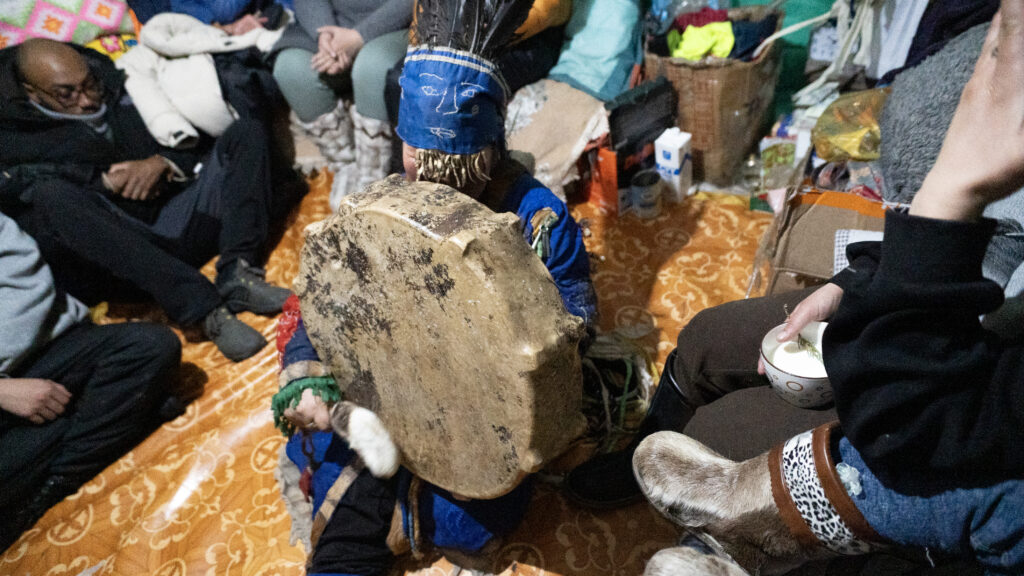
Finally, the shaman explained to me that she didn't remember anything that happened. According to her, it was the spirits of animals that made them move and speak. “I'm like an antenna, I'm just transmitting the message,” he told me so I could understand. He also told me that no one can choose to be a shaman. It is a gift that develops randomly throughout life. In addition, in every settlement there is a shaman and that's it. In this one who hosted me, no disciple had yet appeared to follow in the woman's footsteps.
The most important day of the year
Without knowing it, I entered the busiest day on the entire calendar. Almost all the Tsatans gathered in that village to enjoy a day of competitions and performances in honor of their culture. It was a relatively new festival they started with the aim of attracting tourism and boosting the local economy a bit. It seems to have worked. About fifty people from all over the country and some other foreigners came to watch the games and performances of the culture that is still very much alive.
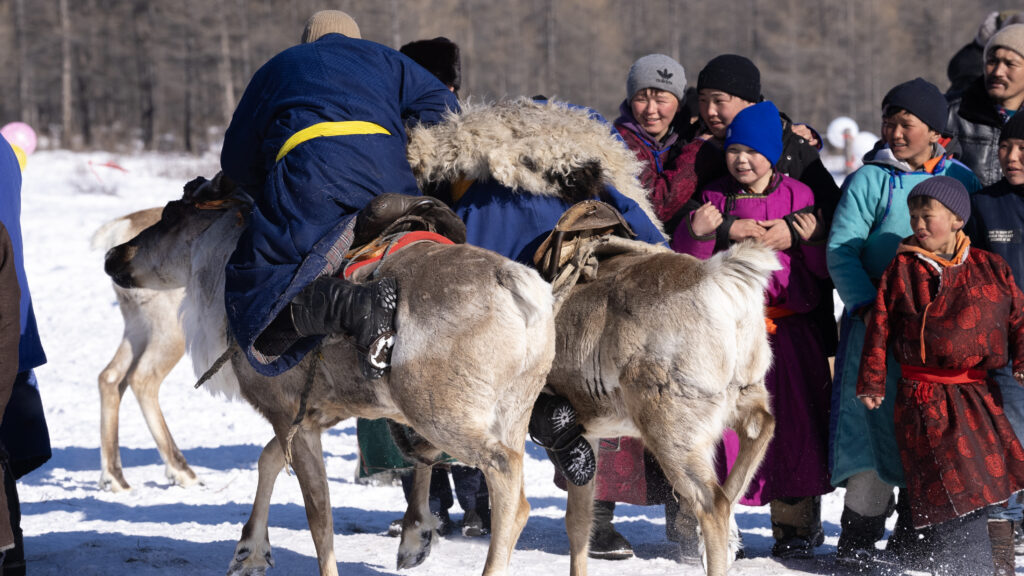
They were able to have a good time with the expected reindeer races, but also with the games of skill riding this animal. I've seen some of those tests in other parts of the country, or in Kyrgyzstan, but on a horse. However, the version I encountered that day was much more enjoyable. For example, one game was to pick up sticks of dirt from the reindeer, or compete with another contestant to see who could keep the sheep's skin. It so happened that since reindeer are much smaller and more agile than a horse, it was common to see participants falling on their noses into the snow when the reindeer lost their balance or became frightened by the sudden change in weight. I have never been to a festival like this where you can hear so much laughter. Also from the same competitors who were pinned to the floor.
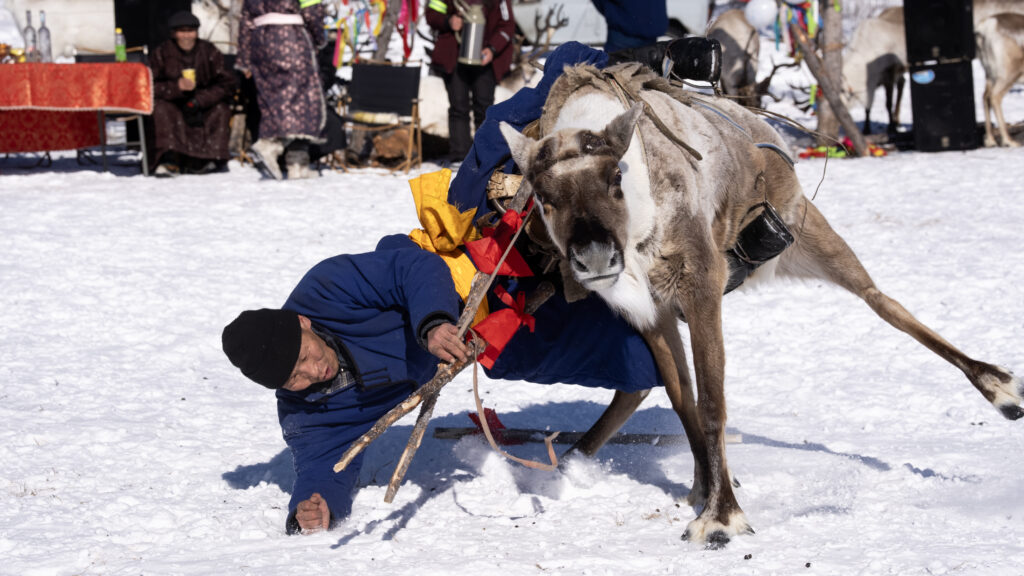
Interestingly, children are responsible for taming the reindeer. Since they are not animals that can carry a lot of weight, it is the youngest members of the tribe who ride and train the reindeer when they are young. In fact, even when they are adults, they cannot lift more than 80 kilograms of weight. However, even today the Tsatans use them to move around and cover long distances, especially in winter.
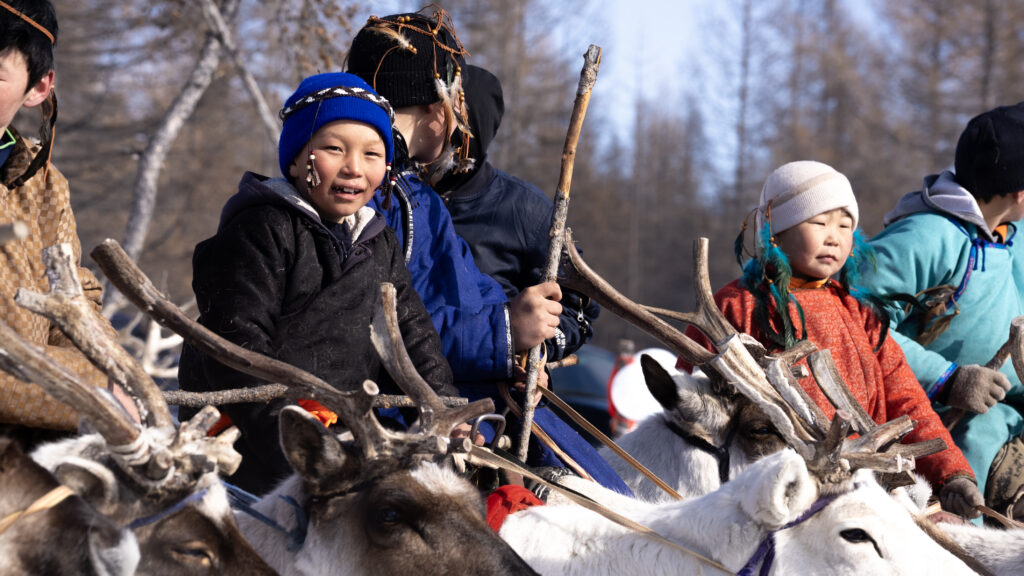
However, if they value reindeer for anything, it is for their milk, even though they only produce it during the spring and summer. They make yogurt and cheese. Contrary to what it may seem, killing them for their meat is not common. They do this only once a year, in November, to have reserves for the winter, when hunting in the forest is almost impossible.
Although the world beyond those mountains is widely globalized, life in the taiga continues largely unchanged from its ancestors. Culture, language and connection with nature are inseparable from the lives of the Tsatans, who seem unwilling to give up what makes them unique, and makes them happy, as they say. As the snow melts and spring arrives, families will prepare in the coming weeks to gather the tent and their flocks and search for a new place to settle and continue the cycle of life for another year.

“Freelance social media evangelist. Organizer. Certified student. Music maven.”
